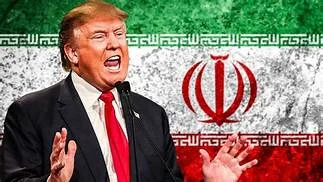Let There Be War
/here’s no love lost between Donald Trump and the Bush clan. Like an argument at Thanksgiving dinner, they’re feuding members of the same political family. But that doesn’t mean that Trump doesn’t learn, and sometimes borrow, from the traditional GOP playbook.
The case in point is Trump’s maniacal saber-rattling this week about the prospects for invading Iran. (An aircraft carrier and four B-52’s are moving into position. While Trump denied imminent plans to mobilize a force of 120,000, he helpfully added that, if necessary , “…we’d send a hell of a lot more troops than that.”)
First, a little background. Down in Texas there’s an author named Mickey Herskowitz who’s an acclaimed master of the “as told to” genre of biographies—in other words, he’s a ghost writer. His subjects range from baseball’s Mickey Mantle to football’s Bear Bryant to the lawyer who won the biggest lawsuit in history. All this brought him to the attention of the first President Bush, who hired him to write a biography about his late father, Prescott. The family liked it well enough that when Bush the younger decided to run for president, Herskowitz was hired to write the requisite “candidate book”. He was granted virtually unfettered interview time with “W”.
During one of those sessions, Herskowitz reports that W told him about a strategy that Dick Cheney urged him to follow if elected (this before Cheney became his Vice President). “Start a small war,” Cheney is quoted as advising. “Pick a country where there is justification you can jump on, (then) go ahead and invade.”
This sounds almost ridiculously cynical. But Trump is old enough to remember three prime examples that worked for mainline Republicans:
(1) 1983: Ronald Reagan and Granada. Reagan stated that there were American medical students on the island who might be endangered by ongoing political turmoil. The 1,500 members of the Grenadian armed forces had no planes, no ships, not a single tank. They also didn't have a chance. So, the 8,000 U.S. troops who invaded didn’t meet much resistance. Afterwards, the U.N. overwhelmingly ruled it, “a flagrant violation of international law.” No matter. Prior to Granada, polls had shown Reagan trailing two potential Democratic rivals in his bid for reelection by between two and 10 points. Post-invasion, his numbers jumped to a three-to-six-point advantage. And he won again.
(2) 1989: George H.W. Bush and Panama: For years, Manuel Noriega of Panama was a paid asset for the CIA. During part of that time, George H.W. Bush ran the CIA. But Noriega’s shift of allegiance toward the USSR…and his indictments in the U.S. for helping transfer illegal drugs to America…turned Bush against him. And in Panama, there were more than medical students protect; to guard a canal the U.S. still owned, 30,000 American citizens were in country. After two failed coups against Noriega and a disputed election, Bush decided his old employee had to go. It was over in four days. Noriega temporarily escaped to the Vatican embassy—but eventually surrendered amid deafening, 24-hour-a-day rock music blasted around him. Thus, the deed was done. Bush’s favorable job approval, which had been just 59% earlier that year, quickly soared to 77%.
(3) 2003: George W. Bush and Iraq: Most remember the thinnest pretext imaginable for invasion—seizure of “weapons of mass destruction” --which turned out never to have existed. But that fact would take years to prove. In the immediate wake of the invasion, Gallup said agreement on “the (positive) direction of the U.S.” leaped 24 points…from 36% to 60%. Maybe this is what was on W’s mind when he stood before the banner reading, “MissionAcolplished"--after all, he won his second term.
Of course, Democratic presidents have also overseen overseas crises: for example, the Iran hostages, and genocidal conflicts in Kosovo and Syria. But those were responses, not predetermined U.S. invasions.
By the end of the week, Trump was giving mixed signals. Stories were planted that he really didn't want war. But this came at the same time he was slapping even tougher sanctions on Iranian exports--and warning European nations that acceptance of those exports "will no longer be tolerated." Huh?
You could look at this as just another example of dysfunctional Trump foreign policy. Or you could alternately see it as the pretext for Trump saying someday, "I told you I didn't want to do it. But they left me no choice."
As we've seen, this play has been called before in similar circumstances. More than half of the country disapproves of Trump's presidency. It's time to swing some votes.
And if some U.S. lives have to be sacrificed in the the name of such a brave and selfless act, that's a small price to pay for the continued reign of King Donald, isn't it?
Have a comment or thought on this? Just hit the Your Turn tab here or email us at mailbox@cascadereview.net to have your say.



